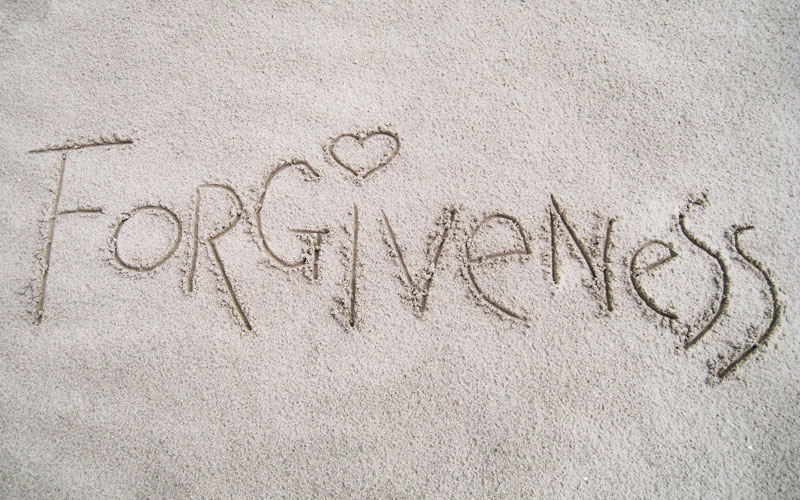- “It hurts too much to keep forgiving him for repeated sins.”
- “Can’t I just overlook her sin against me?”
- “He hurt me so deeply that he doesn’t deserve forgiveness.”
- “Why am I still hurting over an offense when I said I forgave her?”
What does God’s Word have to say about each of these situations?
1. ‘It hurts too much to keep forgiving him for repeated sins.’
First, let’s be clear: forgiveness and reconciliation are different. You can’t have reconciliation without forgiveness. Reconciliation requires repentance, a changed pattern of living, and the rebuilding of trust in addition to forgiveness.
If reconciliation is like a bridge, forgiveness is like the footing of the structure on either side of the river. Forgiveness may be able to happen without repentance (Mark 11:25), but reconciliation cannot. The bridge of reconciliation is constructed by a changed pattern of living (from the wrongdoer) and the allowance for rebuilt trust (from the victim).
We can forgive without being reconciled—the footing can exist without the bridge. Just as the construction of the footing precedes the building of the bridge, forgiveness precedes reconciliation. Forgiveness is releasing the wrongdoer from what he owes you and opening the door for trust to be rebuilt. It always hurts; it always costs something dear. We must fully release to God the justice owed us. But forgiveness doesn’t mean instant reconciliation.
The wrongdoer being unwilling or unable to change can create deeper wounds. Such persistent wounds might mean reconciliation needs to be halted. Perhaps a protective boundary needs to be put in place or a tie needs to be cut. Be brave in seeking professional counsel. We may need to allow more time for the offender to prove trustworthy through a transparent and tangibly changed life. We also must acknowledge that forgiveness doesn’t eliminate the legitimacy—or in some cases, necessity—of pursuing legal justice against a perpetrator.
Nevertheless, forgiveness hurts. If your heart is overwhelmed, it may be because you’re trying to reconcile when God is first asking you to forgive.
2. ‘Can’t I just overlook her sin against me?’
Yes, you may certainly overlook an offense committed against you. The Bible says it’s our “glory to overlook an offense” (Prov. 19:11). The one who “covers an offense seeks love” (17:9). Peter tells us that as hearts overflow with the love of Christ, “love covers a multitude of sins” (1 Pet. 4:8).
We should be careful about our motives though. To truly overlook an offense, you must forgive the individual and not hold it against her or let it hinder the relationship. In addition, you must determine that overlooking the offense is in the offender’s best interest. We might be able to truly overlook the offense but still determine that loving confrontation is best for her. Beware of overlooking an offense because of fear rather than love.
3. ‘He hurt me so deeply that he doesn’t deserve forgiveness.’
You’re entirely right; none of us deserves forgiveness. The world tries to navigate forgiveness by minimizing sin, but even the smallest sin is egregious if we view it as God does. “The wages of sin is death” (Rom. 6:23)—there’s no sin that doesn’t deserve eternal damnation. There’s no sin that doesn’t exile us from Eden.
The answer isn’t to deny, excuse, or minimize the sin committed against us. It’s to discover the deep well of God’s forgiveness for us. This is the whole point of Christ’s parable about the unforgiving servant (Matt. 18:23–35). An important detail is that the second servant owes the wicked servant no small amount. A hundred denarii is equivalent to four months’ wages for the common laborer—more than $10,000 today. Releasing someone from a $10,000 loan is a big deal. Jesus doesn’t diminish the harm done to us and the cost of forgiving that debt.
How, then, can we forgive? Only when we consider how much God has forgiven us. The king in the parable represents God, of course. Ten thousand talents (roughly $7 billion today) is impossible to repay. Even if you earned a six-figure salary, it would take you 1,000 lifetimes to pay it off. Jesus isn’t exaggerating for effect; the cost of our forgiveness is nothing less than the death of the holy, perfect, incarnate Son of God. Christ died for us that we might live with God—and this gift is free for us. As Paul concludes Romans 6:23, “The wages of sin is death, but the free gift of God is eternal life in Christ Jesus our Lord.”
We don’t forgive because sins committed against us are manageable or diminished but because we’ve experienced the extravagant mercy and forgiveness of Jesus Christ.
4. ‘Why am I still hurting over an offense when I said I forgave her?’
We’re told to “forgive and forget.” Isn’t that what God does? No. While God has mercifully removed our transgressions “as far as the east is from the west” (Ps. 103:12), he doesn’t lose omniscience when it comes to our sin. He doesn’t forget our sin—he chooses not to remember. He treats us as though we haven’t sinned and are as righteous as Christ himself. The incarnate and ascended Son of God still bears the scars of the cross in heaven. They’re healed, yet they remain.
Neither are we expected to forget sins committed against us. To make excuses or pretend as though the sin didn’t happen is folly. When serious sins are committed against us, we often don’t fully comprehend the depth of the harm. It’s not unusual to forgive someone only to later realize more forgiveness is required. Forgiveness is both a decision and a process.
If someone gossips about you, for example, you might initially realize your need to forgive her for misrepresenting you—only to later realize you need to forgive her a second time for the way it’s negatively affected others’ views of you. It’s normal to feel the sting of sin against you in a fresh way as each layer of consequence is revealed.
It might take years to heal from the trauma, and even when we’re healed, we may still (like Christ) bear the scars of others’ sins against us. Bearing scars doesn’t necessarily mean you haven’t forgiven.
Difficult and Painful
It’s a difficult and painful question, but the Bible graciously answers it. To forgive is, ultimately, to release control of the offender into the hands of a just and merciful Judge for perfect vindication, and perhaps retribution (Gen. 18:25; Rom. 12:19–20). To forgive is to trust our Healer that he’ll make all things right and salve the wounds inflicted on us. But unforgiveness allows us to be hurt over and over again—once by the initial offense and constantly thereafter as we hold on to it.
It’s a good thing the One to whom we turn when struggling to forgive has already forgiven us and paid the cost to repair the ways we’ve wounded him. Thanks be to God for his inexhaustible forgiveness.
By John Beeson / Why Do I Have to Keep Forgiving? (thegospelcoalition.org)










